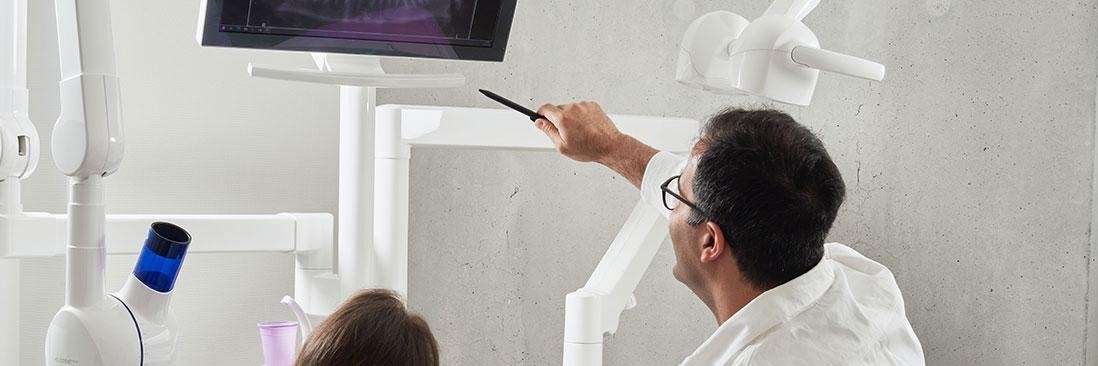
Visiting the dentist is an essential part of maintaining proper dental health and avoiding unnecessary pain in the long-run—not to mention potentially costly bills. Professionals recommend two annual visits for a general check-up and dental cleaning as a means of preventing gum disease or other dental problems.
However, when said problems actually arise, you might need to seek the help of a dental specialist such as when getting braces or treating periodontal disease. But what exactly is periodontal disease and how can you determine when you need to see a specialist versus your general dentist?
What is Periodontal Disease?
Periodontal disease, in its earliest form, is commonly known as gingivitis, a mild form of gum disease that causes the area around your teeth to become irritated. Symptoms include redness, swelling, bleeding gums when brushing your teeth, and sensitivity. If caught in its early stages, gingivitis can be treated to prevent further damage with a deep clean by your general dentist.
However, if not treated promptly, gingivitis can develop into a more serious form of gum disease called periodontitis that can lead to gum recession, tooth loss, and even jawbone damage. Unfortunately, this stage of gum disease cannot be cured but it can be treated to prevent further damage. Determining whether to seek a general dentist vs a periodontist will entirely depend on the severity of your condition.
The Difference Between a General Dentist and a Periodontal Dentist
A general dentist is a primary dental provider that treats your overall basic oral care needs. From periodic dental cleanings to the occasional fillings, a huge chunk of what this dental health professional is responsible for is preventative care. Additionally, a general dentist can perform tooth extractions, root canals, x-ray analysis, and diagnosis of more serious diseases.
A periodontist on the other hand is a dental specialist qualified to diagnose and treat gum and bone infections such as periodontitis, the most serious form of gum disease. To manage the infection, a periodontist may perform a deep cleaning of the pockets around the infected gums often referred to as planing and scaling or a soft tissue graft to replace lost gum tissue. If the bone around the affected tooth becomes compromised, a periodontal dentist may perform a bone graft to help prevent further damage.
Signs You Need to See a Periodontist
Dental issues arise over time even when you think you are diligently maintaining proper dental hygiene and early signs of periodontal disease can become apparent when you least expect them. Schedule an appointment with a periodontist as soon as you experience the following:
· Swollen Gums: The buildup of plaque and tartar around your teeth is a common cause of inflamed gums. This can be reversed with prompt treatment but if left unchecked, the inflammation can create pockets around your teeth that can lead to tooth loss.
· Bleeding Gums: This is commonly a cause of swollen, irritated gums that make the tissue sensitive to the simple act of flossing and brushing your teeth. This is a serious sign of advancing periodontal disease that should not be ignored.
· Bad Breath: The same bacteria attacking your gums and teeth can also lead to bad breath. This is also thought to be caused by buildup of plaque on the tongue, a clear sign that the disease-causing bacteria is not being properly controlled.
· Receding Gums: A more serious sign of advancing disease, receding gums can lead to root exposure and tooth loss. Note that receding gums do not happen overnight, but if you notice your teeth are looking longer than usual then it’s time to visit a periodontist.
· Loose Teeth: This is also an early sign of bone loss. If you notice your teeth are shifting or are having trouble chewing, make sure to schedule an appointment as early as possible!
Ways to Prevent Periodontal Disease
Preventing gum disease is actually quite simple. Establishing and following a proper oral health routine can significantly decrease your chances of getting periodontal disease. It is also important to understand that there may be other underlying causes aside from poor dental hygiene such as genetics, hormonal changes, autoimmune disorders, and even medications. However, as a rule of thumb, you should consider these preventative practices:
· Brush your teeth at least twice a day, preferably with an electric toothbrush
· Floss daily or immediately after a meal
· Visit your dentist at least twice a year for dental cleanings
· Consider a low-sugar diet
Visiting a Periodontist
If you think you might need a Periodontist, our team at Texas Periodontal Associates is warm and welcoming, and it’s our number one goal to make you feel comfortable. Please don’t hesitate to reach out with any teeth-related questions you may have, and we’ll be more than happy to help you.
If you’d like to schedule an appointment, you can give us a call at 713-457-6351 or fill out our online form. We look forward to hearing from you!

